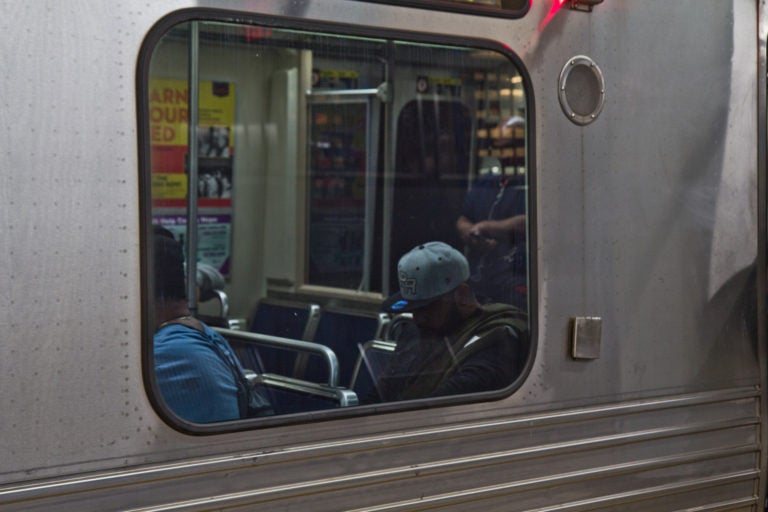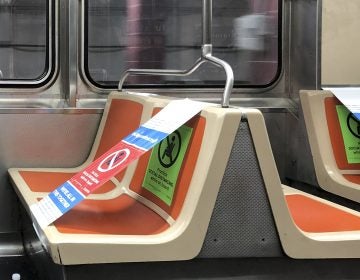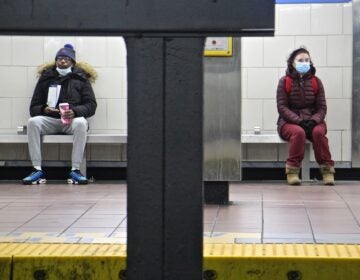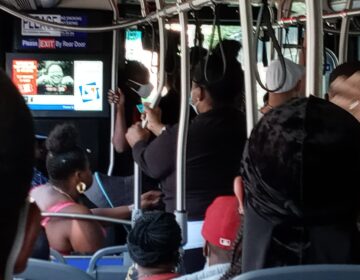‘If you don’t have to ride, please don’t’: SEPTA, PATCO further reduce service
SEPTA is cutting back its already reduced Regional Rail service after ridership dropped by more than 90% this week. PATCO is also reducing services.

SEPTA said that ridership is down due to the coronavirus. (Kimberly Paynter/WHYY)
SEPTA is cutting back its already reduced Regional Rail service after ridership dropped by more than 90% this week.
Passenger trains on most lines will run every two hours, Airport Line service will run every hour. The Cynwyd line will operate Monday through Friday. The rest will operate seven days a week. Details of the changes to the five-county rail service can be found here.
City buses, trains, and trolleys will continue to operate on a Saturday schedule. Ridership on those modes dropped by more than 70% last week.
Authority officials have implemented a series of cost-cutting measures including pay cuts for the 15-member executive team, a hiring freeze, and elimination of overtime as they continue with business as usual. More cutbacks may be on the way.
SEPTA estimated a loss of more than $150 million to its $1.49 billion operating budget for this fiscal year as riders, many now unemployed or working from home, hunker down in their homes, and avoid public transportation when they do step out, due to a statewide stay-at-home order.
Still, the decrease in ridership is not unwanted. Officials are begging riders to avoid the system, as they prioritize essential workers and service-seekers traveling during the statewide shutdown.
“We are pleading with our customers – if you don’t have to ride, please don’t,” said SEPTA general manager Leslie S. Richards in a press release. “We need to reserve space on our buses, trains, and trolleys for those who need to get to essential jobs, or access life-sustaining services.”
The U.S. now has the most cases in the world, according to research from Johns Hopkins University and Medicine. Transit authorities nationwide are settling into this new reality as the coronavirus pandemic ramps up, prompting more states to urge residents to stay home in an effort to slow the spread.
SEPTA’s service region—Philadelphia, Montgomery, Delaware, Bucks, and Chester County— has more than 1,100 of Pennsylvania’s nearly 1,700 cases at the time of this report. There have also been three reported cases of infection among SEPTA workers.
“They’re not private companies out to make money,” Megan Ryerson, an associate dean at the University of Pennsylvania, said of public transit systems. “They operate because they’re here to provide mobility in regions. That’s really incredible, to think that their mission is to be there for you during disaster times, and there for you in the best of times, and everything in between.”
The authority is moving forward with their FY2021 operating and capital budget proposals as well as the public hearing process for its new fare proposal. Spokesperson Andrew Busch says not doing so will set them back even further.
A 2018 EConsult report found SEPTA’s economic impact totaled more than $3 billion in the state, supporting more than 23,000 jobs.
SEPTA and mass transit agencies nationwide ought to see some relief in the form of $25 billion in aid included in a federal stimulus package making its way through Congress to the president’s desk for signature. But experts say SEPTA faces uncertainty beyond immediate relief. Ryerson likened the crisis to post-9/11 and the 2008 recession.
“There are industries chomping at the bit to come back,” said Ryerson, a UPS chair of Transportation at UPenn. “However, there will also be a lot of economic implications. Small businesses are taking a significant hit. Tourism will likely be down for some time, and less discretionary income across the population because of this economic time.”
PATCO officials announced temporary closures of four stations along its service line and additional changes to its schedule.
Stations at 12/13th and Locust Street, City Hall in Camden, Ashland, and Westmont will close starting March 28.
The closures seek to prioritize the safety of customers and employees, officials say. The remaining nine stations — Lindenwold, Woodcrest, Haddonfield, Collingswood, Ferry Ave., Broadway (Walter Rand Transportation Center entrance open), 8th & Market, 9/10th & Locust St. and 15/16th & Locust St. Stations — see the most riders.
“The decision was made to serve the greatest number of people who still need to use the line while enabling us to concentrate our law enforcement and sanitizing efforts to ensure the greatest protection for the people riding the line at this time, and also to ensure the sustainability of the line to make sure that we will have sufficient personnel,” said John Hanson, PATCO president.
The Delaware River Port Authority oversees PATCO and the four bridges that connect Philadelphia to New Jersey — the Ben Franklin, Walt Whitman, Betsy Ross, and Commodore Barry.
The port authority announced freezes on both PATCO fares and bridge tolls in January after a successful year. PATCO saw a 25-year high in ridership in 2019. Over 11 million people used the service, and officials raked in $27 million in revenue. Officials said fares will remain unchanged so long as it’s financially viable. Now, Hanson, also CEO of DRPA, says ridership on the train service is 8% of its normal count. He estimates it will result in a loss of $2.2 million a month.
As for the four bridges, which are now temporarily cashless, traffic is down by about 55%. This results in losses of more than $2 million per week, says Hanson. More than 53 million vehicles crossed, last year, generating more than $332 million for the agency.
WHYY is your source for fact-based, in-depth journalism and information. As a nonprofit organization, we rely on financial support from readers like you. Please give today.






![CoronavirusPandemic_1024x512[1]](https://whyy.org/wp-content/uploads/2020/03/CoronavirusPandemic_1024x5121-300x150.jpg)



